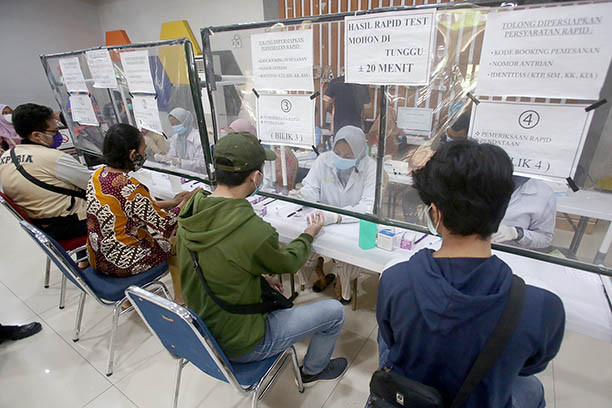Popular Reads
Top Results
Can't find what you're looking for?
View all search resultsPopular Reads
Top Results
Can't find what you're looking for?
View all search resultsTravelers no longer required to take COVID-19 rapid test for certain train routes: KAI
State-owned train operator PT Kereta Api Indonesia (KAI) has announced that passengers are no longer required to take a COVID-19 rapid test prior to boarding the trains of certain routes.
Change text size
Gift Premium Articles
to Anyone
 Long-distance train passengers take rapid tests at Pasar Senen railway station in Central Jakarta on Oct. 27. The latest announcement by state-owned train operator PT KAI states that travelers are no longer required to take a rapid test prior to departure depending on the route. (JP/Wendra Ajistyatama)
Long-distance train passengers take rapid tests at Pasar Senen railway station in Central Jakarta on Oct. 27. The latest announcement by state-owned train operator PT KAI states that travelers are no longer required to take a rapid test prior to departure depending on the route. (JP/Wendra Ajistyatama)
State-owned train operator PT Kereta Api Indonesia (KAI) has announced that passengers are no longer required to take a COVID-19 rapid test prior to boarding the trains of certain routes.
The announcement was posted through KAI’s official Instagram account, @kai121_, on Wednesday.
KAI vice president for public relations Joni Martinus said the updated policy was added to circulars signed by the national COVID-19 task force and the Transportation Ministry.
The circulars state that travelers are still required to show official letters stating that they are free from COVID-19. These letters can be obtained after conducting a polymerase chain reaction (PCR) test or rapid test, or obtaining a medical statement from hospitals or community health centers if there is no available testing facility nearby.
However, commuters of certain clusters, or “agglomeration areas” as the KAI puts it, are exempt from the regulation.
“This means commuters, as well as train passengers of certain agglomeration routes, are not required to take a rapid test prior to traveling,” Joni said as quoted by kompas.com on Wednesday.
Read also: Railway operator KAI records Rp 2.4 trillion loss in September despite recovery signs
However, Joni added, those commuters and travelers were still required to comply with health protocols upon boarding the train, such as wearing masks or donning long-sleeve clothes.
Moreover, travelers are encouraged to board the train in a healthy condition and have a maximum body temperature of 37.3 degrees Celsius.
Joni stated that so far there had been no changes regarding the rapid test policy for long-distance train rides. He further said that the post on KAI’s Instagram account provided details on which train routes were classified as local, commuter or agglomeration routes.
“Rapid tests are still needed [for routes other than the local, commuter and agglomeration areas],” he said.
KAI has resumed operations for 14 long-distance and 23 local passenger trains after shutting down services for two months over fears of COVID-19 transmission.
The operator had originally halted services in April and following the government’s ban on the Idul Fitri mudik (exodus) in May, but gave exemptions for certain travelers.
As a result of decreasing travel demand due to COVID-19, KAI reportedly suffered a Rp 2.4 trillion (US$163.6 million) loss between January and September, a drastic drop from the Rp 1.5 trillion in profit it booked in the same period last year. (dpk)
Editor’s note: This article is part of a public campaign by the COVID-19 task force to raise people’s awareness about the pandemic.









